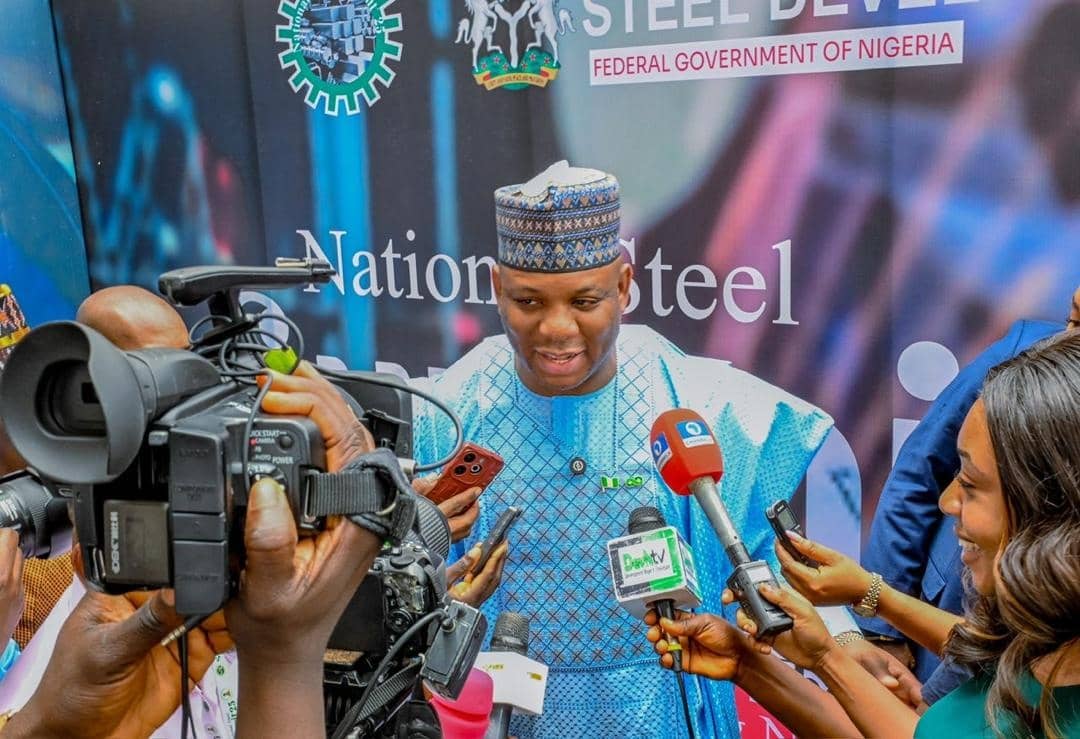Paulina Ogar, Abuja.
The Honourable Minister of Steel Development,
Prince Shuaibu Abubakar Audu is reportedly setting the pace like no other in the Steel Industry.
The Minister of Steel Development, Prince Audu reiterated his commitment of consolidating and and sustainable steel development during the National Steel Summit in Abuja on the 13th of August 2025.
The auspicious event assembled key stakeholders to appraise the current status of the Nation’s Steel industry, explore investment opportunities, identify policy and infrastructural gaps and come up with consensus recommendations as a way forward for the rejuvenation and sustainable development of the Nigeria Steel Industry.
Prince Aiding said the key priority areas of President Bola Ahmed Tinubu, GCFR administration include;
Reforming the economy to deliver sustained inclusive growth
Strengthening National Security for peace and prosperity
Boosting Agriculture to achieve food security
Unlocking Energy and Natural resources for sustainable development
Enhancing infrastructure and transportation as enablers of growth
Focusing on Education, Health and Social investment as essential pillars of development
Accelerate diversification through industrialization, digitization, creative arts, manufacturing and innovation and
Improving governance for effective service delivery.
A critical evaluation of the eight (8) point agenda suggests the critical place of the Steel sector in the realization of these goals especially in the areas of industrialization, manufacturing and unlocking the natural resources potentials of the country.
In his turn Engr. Umar Albarka advocates for providing funding windows to operators involved in producing iron and steel raw materials.”It is noted that most companies globally source raw materials from the global market. However, for a nascent industry like Nigeria’s steel sector, relying on global sourcing would be a disadvantage. It would be more beneficial if locally available materials were utilized, but operators face significant funding challenges that government support could alleviate”.
According to him there is a critical need for the government to establish accessible funding windows for operators. Specific funds like the Sovereign National Wealth Fund, the SMDF fund (which receives monthly allocations), and funds available through the CBN should be targeted. He said these funds are crucial for operators to procure necessary equipment and should be prioritized over unreliable budgetary allocations, which often face delays or non-releases and are insufficient for capital-intensive needs; emphasizing that relying on budgetary funding will not foster industry growth, as evidenced by complaints about unreceived budget allocations.
While the Sole Administrator of Ajaokuta Steel Company Limited, Prof. Nasir Naeem Abdul Salam talked with an analogy of ‘going into Steel business’ and questions about why certain companies are involved in specific industries
Prof. Nasir recalls a past ‘many steel Summit’ where Nigeria’s 2020 steel production targets were set at 12.2 million tons, with 5.2 million from Africa and the rest from the private sector. There’s also a brief mention of Ministers’ roles related to the industry.
He emphasizes the need to move beyond past problems, urging a shift from just discussion to running the steel sector as a business, starting small and scaling up. They note that many Nigerians trained in metallurgy abroad are now retired or in academia. He suggests that Nigeria, as an ‘imitator’, should learn quickly from successful examples like India, Saudi Arabia, and Egypt, which combine various steel production approaches. They propose focusing on areas that can yield immediate returns.
However, Dr. Patrick Okonji- highlighted the substantial and massive raw material requirements needed for this operation.
Just as it was previously mentioned by the Vice President, Kashim Shettima that we cannot continue to celebrate the problem of the past, it is time for us to move forward.
End



Leave a Reply